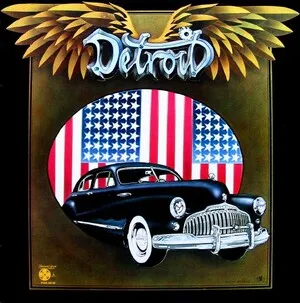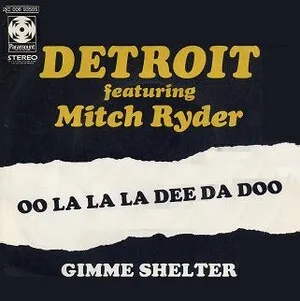Detroit with Mitch Ryder "Detroit" (1971)
The city of Detroit, Michigan has spawned many a rock legend since the 1960's. Over the last six decades, the Motor City has provided the world with a wild managerie of colorful characters, creative risk-takers, and gritty garage rockers -- some of whom (like Bob Seger and Jack White) evolved into musical refinement and commercial success, while others (like the Stooges and the MC5) are legendary for having been too wild for the mainstream. The man who first put Detroit on the rock and roll map and paved the way for later Motor City rockers was Mitch Ryder (who was born as William Sherille Levise, Jr. in 1945). Influenced by the city's Motown soul scene, Ryder added his own high-energy rock and roll intensity to his brand of blue-eyed soul. With his '60's backing band known as the Detroit Wheels, Ryder scored three Top 10 singles between 1965 and 1967, the best-remembered one being "Devil With A Blue Dress On" from 1966. Ryder never matched that success after the breakup of the Detroit Wheels in 1968, but he has recorded more than 25 albums since then, and remains active as of 2023.
Fittingly enough, the man who essentially created the Motor City rock and roll scene fronted a band called Detroit in the early '70's. This band also had the distinction of launching the career of guitarist Steve Hunter, who later collaborated with Lou Reed and Alice Cooper. Other band members included former Detroit Wheels drummer John Badanjek, ex-Catfish keyboardist Harry Phillips and bassist W. R. Cooke, and journeyman guitarist Brett Tuggle.
Detroit cut only one album, the self-titled Detroit, released in 1971. The album was produced by Bob Ezrin, around the same time he began to work with Alice Cooper. The album is considered by many to be a minor classic, but it is currently out of print.
Ryder comes on strong on this album, alternately bellowing and crooning with equal soulfulness, and was well-matched with the hard-rocking musicians who supported him. There was not a large age difference between Ryder and the younger members of Detroit, but the album sometimes comes across like an intergenerational endeavor, as if young rockers were backing an elder statesman, as it mixes Ryder's old-school r&b vocals with '70's hard rock instrumentation. I suppose that illustrates how much of an evolution rock music had undergone in the five years following the release of "Devil With A Blue Dress On". The first two energetic tracks were co-written by Ryder, and are the ones that sound the most reminiscent of the Detroit Wheels. Four of the other tracks are cover songs that work exceptionally well. Suffice it to say that Ryder and company do more than justice to songs by Chuck Berry ("Let It Rock") and Wilson Pickett ("I Found A Love"), rendering the songs with remarkable soul and instrumental vigor. Their rendition of Lou Reed's "Rock 'N Roll" is more rock-and-roll than the Velvet Underground version, foreshadowing the arena rock energy that Hunter would soon help bring to Reed's live Rock 'n' Roll Animal album. (Reed was said to have loved this version of the song, which was the reason he recruited Hunter to join his band). And Detroit's version of Ron Davies' much-covered "It Ain't Easy" has more rock-and-roll fury than, say, Three Dog Night's or David Bowie's, without forgetting the song's country roots.
Ryder also displays impressive soul chops as he croons the ballad "Drink", written by members of Catfish. The only weak track is "Box Of Old Roses", written and sung by bassist W.R. Cooke, whose vocals seem colorless when heard among the many songs sung by Ryder.
Detroit is one of those albums that captures the true essence of rock and roll without sacrificing a bit of visceral excitement. It's worth seeking out.
Detroit did not release another full-length album, but did issue two non-album singles with cover songs, most notably a crusty rendition of the Rolling Stones' "Gimme Shelter" which was later included on CD and cassette reissues of the Detroit album by MCA in 1987. It's an effective interpretation of the song, but Ryder's voice was unfortunately showing signs of wear and tear. Ryder left the band in 1972 when he suffered from throat troubles, and he did not record again until 1978. Detroit soldiered on until 1974, with Ryder replaced by Rusty Day (formerly of the Amboy Dukes and Cactus). In their final days, Detroit took on guitarist Steve Gaines -- who would go on to join Lynyrd Skynyrd in 1976, and tragically die in the 1977 plane crash that halted Skynyrd's career for a decade.

Detroit with Mitch Ryder "Detroit" (Paramount PAS-6010) 1971
Track Listing:
1. Long Neck Goose -- (Mitch Ryder / Bob Ezrin)
2. Is It You (Or Is It Me) -- (Mitch Ryder / Johnny "Bee" Badanjek)
3. It Ain't Easy -- (Ron Davies)
4. Rock 'N Roll -- (Lou Reed)
5. Let It Rock -- (Chuck Berry)
6. Drink -- (Mark Manko / Jimmy Optner)
7. Box Of Old Roses -- (W.R. Cooke)
8. I Found A Love -- (Willie Schofield / Wilson Pickett / Robert West)
Detroit with Mitch Ryder "I Can't See Nobody" (b/w "The Girl From The North Country") (Paramount single PAA-0051) 1971
Track Listing:
a. I Can't See Nobody -- (Bee Gees)
b. The Girl From The North Country -- (Bob Dylan)

Detroit with Mitch Ryder "Oo La La La Dee Da Doo" (b/w "Gimme Shelter") (Paramount single PAA-0158) 1972
a. Oo La La La Dee Da Doo -- (Ken Williams / Mattie Simpkins)
b. Gimme Shelter -- (Mick Jagger / Keith Richards)
Fittingly enough, the man who essentially created the Motor City rock and roll scene fronted a band called Detroit in the early '70's. This band also had the distinction of launching the career of guitarist Steve Hunter, who later collaborated with Lou Reed and Alice Cooper. Other band members included former Detroit Wheels drummer John Badanjek, ex-Catfish keyboardist Harry Phillips and bassist W. R. Cooke, and journeyman guitarist Brett Tuggle.
Detroit cut only one album, the self-titled Detroit, released in 1971. The album was produced by Bob Ezrin, around the same time he began to work with Alice Cooper. The album is considered by many to be a minor classic, but it is currently out of print.
Ryder comes on strong on this album, alternately bellowing and crooning with equal soulfulness, and was well-matched with the hard-rocking musicians who supported him. There was not a large age difference between Ryder and the younger members of Detroit, but the album sometimes comes across like an intergenerational endeavor, as if young rockers were backing an elder statesman, as it mixes Ryder's old-school r&b vocals with '70's hard rock instrumentation. I suppose that illustrates how much of an evolution rock music had undergone in the five years following the release of "Devil With A Blue Dress On". The first two energetic tracks were co-written by Ryder, and are the ones that sound the most reminiscent of the Detroit Wheels. Four of the other tracks are cover songs that work exceptionally well. Suffice it to say that Ryder and company do more than justice to songs by Chuck Berry ("Let It Rock") and Wilson Pickett ("I Found A Love"), rendering the songs with remarkable soul and instrumental vigor. Their rendition of Lou Reed's "Rock 'N Roll" is more rock-and-roll than the Velvet Underground version, foreshadowing the arena rock energy that Hunter would soon help bring to Reed's live Rock 'n' Roll Animal album. (Reed was said to have loved this version of the song, which was the reason he recruited Hunter to join his band). And Detroit's version of Ron Davies' much-covered "It Ain't Easy" has more rock-and-roll fury than, say, Three Dog Night's or David Bowie's, without forgetting the song's country roots.
Ryder also displays impressive soul chops as he croons the ballad "Drink", written by members of Catfish. The only weak track is "Box Of Old Roses", written and sung by bassist W.R. Cooke, whose vocals seem colorless when heard among the many songs sung by Ryder.
Detroit is one of those albums that captures the true essence of rock and roll without sacrificing a bit of visceral excitement. It's worth seeking out.
Detroit did not release another full-length album, but did issue two non-album singles with cover songs, most notably a crusty rendition of the Rolling Stones' "Gimme Shelter" which was later included on CD and cassette reissues of the Detroit album by MCA in 1987. It's an effective interpretation of the song, but Ryder's voice was unfortunately showing signs of wear and tear. Ryder left the band in 1972 when he suffered from throat troubles, and he did not record again until 1978. Detroit soldiered on until 1974, with Ryder replaced by Rusty Day (formerly of the Amboy Dukes and Cactus). In their final days, Detroit took on guitarist Steve Gaines -- who would go on to join Lynyrd Skynyrd in 1976, and tragically die in the 1977 plane crash that halted Skynyrd's career for a decade.
Detroit with Mitch Ryder "Detroit" (Paramount PAS-6010) 1971
Track Listing:
1. Long Neck Goose -- (Mitch Ryder / Bob Ezrin)
2. Is It You (Or Is It Me) -- (Mitch Ryder / Johnny "Bee" Badanjek)
3. It Ain't Easy -- (Ron Davies)
4. Rock 'N Roll -- (Lou Reed)
5. Let It Rock -- (Chuck Berry)
6. Drink -- (Mark Manko / Jimmy Optner)
7. Box Of Old Roses -- (W.R. Cooke)
8. I Found A Love -- (Willie Schofield / Wilson Pickett / Robert West)
Detroit with Mitch Ryder "I Can't See Nobody" (b/w "The Girl From The North Country") (Paramount single PAA-0051) 1971
Track Listing:
a. I Can't See Nobody -- (Bee Gees)
b. The Girl From The North Country -- (Bob Dylan)
Detroit with Mitch Ryder "Oo La La La Dee Da Doo" (b/w "Gimme Shelter") (Paramount single PAA-0158) 1972
a. Oo La La La Dee Da Doo -- (Ken Williams / Mattie Simpkins)
b. Gimme Shelter -- (Mick Jagger / Keith Richards)
Comments